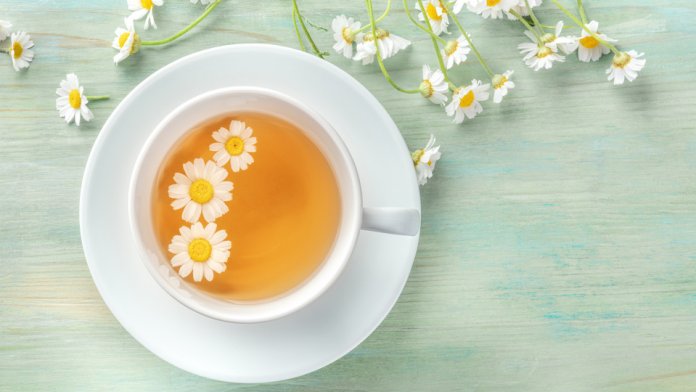There is something so soothing about a warm cup of tea with a splash of lemon and honey. Something that makes us want to slow down, relax, and just be in the moment. Herbal tea is an infusion of any edible plant, and the consumption of these infusions dates back to 2737 BC in China. Written history reveals records of herbal tea as far back as the third century AD. Today, herbal tea is enjoyed all over the world, and these plant infusions pack not only delicious and soothing flavors but also powerful medicinal properties that can tackle just about anything that ails you.
Let’s dig into some of the best herbal teas to enjoy when you are feeling down.
Best teas for cold and flu season
Not only can these teas offer soothing comfort when you have a cold or the flu, but they can also help reduce your symptoms and shorten the duration of the nasty bug.
Eucalyptus tea
Eucalyptus is a popular and widely used natural cold remedy that is often found in cold and cough products. According to research, eucalyptus can lessen mucus and expand the bronchi and bronchioles of the lungs to help you breathe easier. The main ingredient that is responsible for these medicinal properties is eucalyptol. Drinking eucalyptus tea may help relieve cold symptoms like cough, nasal congestion, and headache by decreasing inflammation and mucus buildup
Echinacea tea
Drinking echinacea tea during cold and flu season can help boost your immune system so you can defend yourself against all that’s “going around.” Echinacea has been found to have anti-inflammatory, antioxidant, and antiviral properties along with immune-boosting properties.
Elderberry tea
Elderberries have been a go-to for the common cold for hundreds of years. Some studies show that elderberry tea can shorten the duration of a cold and relieve symptoms that accompany it.
Best teas for a sore throat
Just sipping something warm can help relieve a sore throat. Here are some of the best teas to drink when your throat hurts.
Turmeric tea
Turmeric is often called the golden spice and is well known for its healing properties. According to research published in the Indian Journal of Research in Homeopathy, turmeric is loaded with antioxidants and has potent antiseptic and anti-inflammatory properties that can soothe a sore throat.
Slippery elm tea
If you have ever enjoyed a cup of slippery elm tea, then you know that it has this seemingly magical ability to coat your throat and reduce swelling and pain. This is due to a substance called mucilage that becomes a gel when mixed with water.
Licorice root tea
Known as one of the sweetest teas in the world, licorice root tea can help soothe a sore throat and tackle asthma and other breathing problems. It is 50 times sweeter than sugar, which makes it a tasty tea indeed. Many people let licorice root tea cool and gargle with it to reduce the pain of a sore throat.
Best teas for a headache
Headaches can be a painful disruption in everyday life. Here are some delicious teas that can help ease the tension and pain.
Chamomile tea
The sedative and anti-inflammatory properties of chamomile are well researched and documented. Tension headaches are often caused by stress, and chamomile is able to help ease this stress so that you can let down and relax. Just relaxing is often enough to send a tension headache packing.
Feverfew tea
Feverfew, a plant in the daisy family, is a popular go-to remedy for persons suffering from headaches. It is best used as a preventive treatment for migraines. People who use feverfew have reported that after using it, their migraine attacks have become less frequent and even stopped altogether.
Ginger tea
A study published in the Journal of Phytotherapy Research found that ginger was just as effective as the commonly prescribed medication for migraine pain, Sumatripan.
Best tea for digestive distress
Ginger contains compounds known as gingerols and shogaols that can help with cramping, bloating, gas indigestion and nausea. To make ginger tea, boil two tablespoons of sliced ginger root in 2 cups of water for 10-20 minutes before straining and drinking. You can also opt for an organic ginger tea bag.
Fennel
Fennel is an herb that comes from the flowering plant scientifically called Foeniculum vulgare. Studies show that this licorice tasting plant can help prevent stomach ulcers and ease digestive woes. Make fennel tea by pouring one cup of boiling water over one teaspoon of fennel seeds. Let it sit for 5-10 minutes before pouring through a sieve. You can also use freshly grated fennel root or organic fennel tea bags.
Dandelion
Yes, those pesky yellow “weeds” that you regularly pull from your lawn hold powerful medicinal properties. Studies show that dandelion extracts contain compounds that may help improve the flow of food from the stomach to the small intestine making it a great option for an owly gut. If you are going to make your own tea, be sure to source fresh dandelions from a place where no toxic chemicals are sprayed. A better option would be to purchase organic dandelion tea, either loose-leaf or in a bag.
Cautions
Source all tea ingredients from a reputable place and be sure that you do not have any contradictions with current medication before sipping on herbal teas
Tea anyone?
-The UpWellness Team


